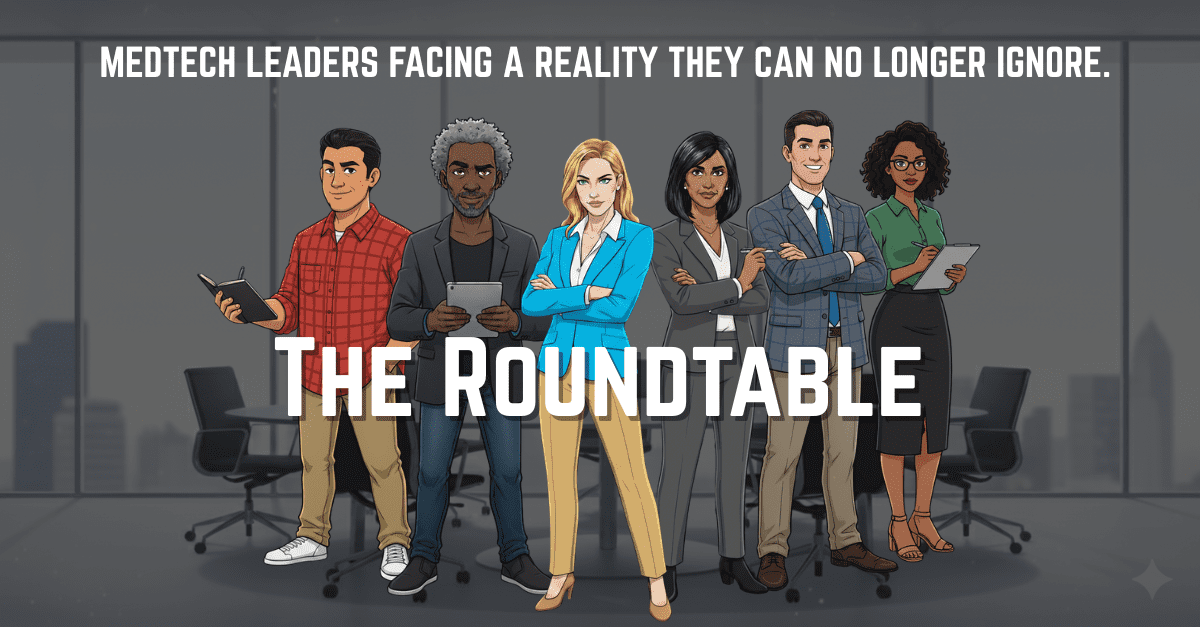
Article
Roundtable Chapter 1 – The One Where the Algorithm Couldn’t Sell Itself
One of the most interesting areas for digital therapeutics (DTx) is its application to behavioral health (also referred to as mental health).
For several decades, many of the most prominent advances in behavioral health therapeutics were pharmacological—think Prozac and Ritalin. However, as we have learned just from observing family and friends, people cannot simply take a drug that gives them total mental wellness. In-person therapy sessions continue to be used extensively. During therapy sessions, patients and their therapists can develop strategies for how to better manage daily life, or go through noninvasive, clinically validated treatments designed to address specific issues. However, the implementation of those strategies is largely left up to the patient once they leave the clinic. While it might be helpful in some cases, it is not feasible for a therapist to shadow the patient everywhere on a 24/7/365 basis to help the patient better react to the minute-by-minute realities of life. (Except perhaps as a Hollywood movie plot.)
DTx holds the promise in behavioral health of bridging the gap between what can be accomplished in a therapy session and what happens to patients in their daily lives. As a result, DTx has been seeing a good deal of interest and activity in recent years. For example:
This year, there have been a $10M+ Series A investments in digital health startups taking a range of therapeutic approaches to improving the mental health and wellbeing of patients.
Taken together, these three firms illustrate four key digital health trends impacting the behavioral health and wellness space.
Ten years ago, it was relatively easy to determine if the software in the healthcare space was subject to stringent FDA regulation or not. Software controlling an insulin pump or a prosthetic limb clearly fell into the regulated space. On the other hand, a CD-ROM that came with a self-help book that was advertised to help you lower your stress and increase your happiness was not something the FDA would be likely to worry about.
Today, as we begin to automate more behavioral health therapies, the line can grow much blurrier. In addition, since some of these solutions are being sold as employee benefits and not as prescribed therapeutics, digital health product firms develop a regulatory strategy that aligns with the business model. So perhaps initially a cognitive behavioral therapy (CBT) solution is sold through employers as an employee benefit. However, the revenue and data generated by the employees’ use of this CBT solution provide a path for the same product to eventually gain FDA clearance, followed by insurer reimbursement as a digital therapeutic.
The bottom line is that, even after digging much deeper into the websites of these firms, it’s still not always 100% clear if these firms are attempting to develop regulated medical devices now or have ambitions of moving to that in the future. Don’t take this as confirmed facts, but our reading of the tea leaves on these firms’ websites and the web in general is that:
1. We need a new mental health strategy.
2. We need evidence-based solutions now more than ever.
3. We need to accelerate scalable, innovation.
4. Regulatory systems need to keep pace.@Oxford_VR_Ltd— Oxford VR (@Oxford_VR_Ltd) May 14, 2020
Both Quit Genius and Unmind are focused, at least in part, on enabling employers help their employees to improve their overall health and wellness.
Both firms embed sliding scale calculators on their homepage that estimate the prevalence of health issues among their employees and then estimate the impact of these issues on employers using metrics such as days of work missed, the cost of related healthcare treatments and the cost of employee turnover.
FDA regulated or not, Oxford VR, Unmind and Quit Genius are all playing up their extensive expertise and data-driven scientific evidence that their programs work. Apparently and thankfully, no one wants to be remembered as the HR executive or doctor who fell for a con job from the next Theranos. (Presumably, their new investors share that same fear and did their due diligence.)
In the following screenshots from all three startups, note the selection of these specific phrases:
In response to the endless questioning of if (or when) digital health software will eliminate the jobs of professionals, both Quit Genius and Unmind are built around a delivery model that still leverages clinicians to stay engaged directly with patients at the moments where human-to-human conversation and contact is still the most appropriate tool for intervention.
Wrap Up
The application of DTx to behavioral health holds great promise for improving patient outcomes and bending the healthcare cost curve. We hope to check back on these three firms in a few years and find that their solutions have successfully scaled based on their proven ability to deliver on these goals.
In the meantime, if you think we should have specifically mentioned other promising (or proven) DTx in the behavioral health space, drop us a line!
Footnotes
**
Orthogonal is a software developer for connected mobile medical devices (CMMD) and Software as a Medical Device (SaMD). We work with change agents who are responsible for digital transformation at medical device and diagnostics manufacturers. These leaders and pioneers need to accelerate their pipeline of product innovation to modernize patient care and gain competitive advantage.
Orthogonal applies deep experience in CMMD/SaMD and the power of fast feedback loops to rapidly develop, successfully launch, and continuously improve connected, compliant products—and we collaborate with our clients to build their own rapid CMMD/SAMD development engines. Over the last eight years, we’ve helped a wide variety of firms develop and bring their regulated/connected devices to market.
Bernhard Kappe is Founder and CEO at Orthogonal. You can email him at [email protected]
Randy Horton is VP of Solutions and Partnerships at Orthogonal. You can email him at [email protected]
Related Posts

Article
Roundtable Chapter 1 – The One Where the Algorithm Couldn’t Sell Itself

Article
Managing Emerging Risks in SaMD: Strategies for 2025 and Beyond

Article
Emerging Opportunities in SaMD and MedTech for 2025

Article
Creating a Risk-Based Approach for SaMD Development